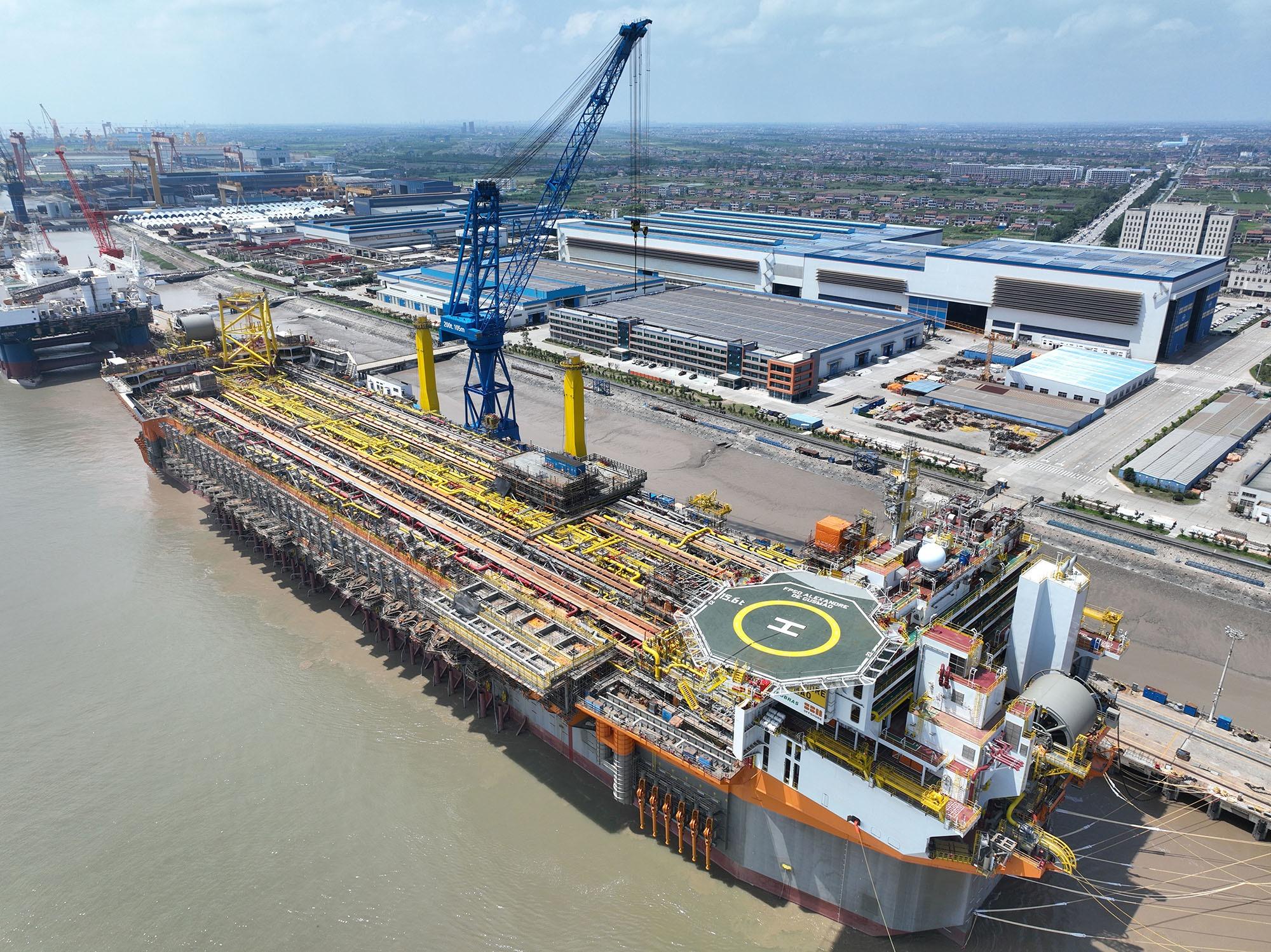Supply chain growth, green shift, tech edge, market expansion are big factors
 A view of an FPSO vessel which is close to completion in Qidong, Jiangsu province. (XU CONGJUN / FOR CHINA DAILY)
A view of an FPSO vessel which is close to completion in Qidong, Jiangsu province. (XU CONGJUN / FOR CHINA DAILY)
China's shipbuilding industry will continue to lead the global race this year on the back of its supply chain growth, market expansion, and intelligent and green transition over the years, said analysts and industry sources.
The industry has become adept at constructing all types of mainstream vessels, reflecting its versatility and innovative capabilities, they said.
Their view is borne out by data. In terms of volume, orders for new ships across the global industry reached 41.49 million compensated gross tonnage in 2023, according to the latest data released by the London-based shipping services provider Clarkson Plc.
Chinese shipbuilders took the lead with a 59 percent share of the global share, accounting for 24.46 million CGT, while South Korean shipbuilders accounted for 24 percent, amounting to 10.01 million CGT. South Korea's shipbuilding industry trailed China for the third consecutive year in 2023.
The greatest strength of China's shipbuilding industry lies in its capabilities, said Huang Jiantao, an analyst at the Shanghai Merchant Ship Design and Research Institute, a unit of China State Shipbuilding Corp.
Chinese shipyards have been expediting their shift toward green and intelligent shipbuilding while bolstering independent design and industry-supporting capabilities, especially in the areas of building liquefied natural gas (LNG) carriers, car carriers, core components and new materials, said Huang.
The shipbuilding industry is often referred to as the "crown jewel of integrated industries". It involves a multitude of components, a lengthy supply chain and high levels of industrial interconnectivity, encompassing over 50 different sectors, including steel, nonferrous metals, machinery and electronics, said the Beijing-based China Machinery Industry Federation.
China's shipbuilding industry has increasingly focused on domestic self-reliance, particularly in its industrial and supply chains. This approach has substantially cut construction times and costs during various projects, said Zeng Ji, a professor of shipbuilding at Shanghai Maritime University.
"In this market, efficiency is critical as shorter delivery times for vessels often attract more orders from shipowners," said Zeng, adding that by producing materials domestically, Chinese shipyards have not only stimulated the growth of their industrial chain but also increased their profitability. This strategy will continue to create a mutually beneficial scenario for both shipyards and their global clients.
China's ship exports were worth $24.4 billion in the first 11 months of 2023, up more than 21 percent year-on-year, data from the Beijing-based China Association of the National Shipbuilding Industry showed.
Nantong, Jiangsu province-based Nantong COSCO KHI Ship Engineering Co Ltd exported 12 types of ships in 2023, with export revenues reaching $790 million.
"Among them, there are three 24,188 TEU (twenty-foot equivalent unit) mega containerships, for which we have full intellectual property rights. Each of these ships has a length of 400 meters and a deck area that surpasses the size of three standard soccer fields," said Chen Haoyu, head of the company's procurement department.
Based on its current order backlog and production schedule, the Chinese shipyard will commence construction, testing and delivery of eight more ships of the same class from this month.
Between January and November last year, China Merchants Heavy Industry (Jiangsu) Co Ltd, another Nantong-based shipyard, exported six ships, including polar expedition cruise ships and wind turbine installation vessels, with a combined value of nearly $900 million.
If the company has to deal with the same type of ships, it can mass-produce, said Shi Liechao, a manager at the sales unit of the company. "With more orders, cost reductions become possible, enhancing the overall value of our production line."
China saw new shipbuilding orders surge nearly 64 percent year-on-year to 64.85 million dead-weight tons (DWT) from January to November last year, taking up almost 66 percent of the world's total during the period, data from the Ministry of Industry and Information Technology showed. China's shipbuilding output climbed more than 12 percent year-on-year to 38.09 million DWT, accounting for half of the world's total.


